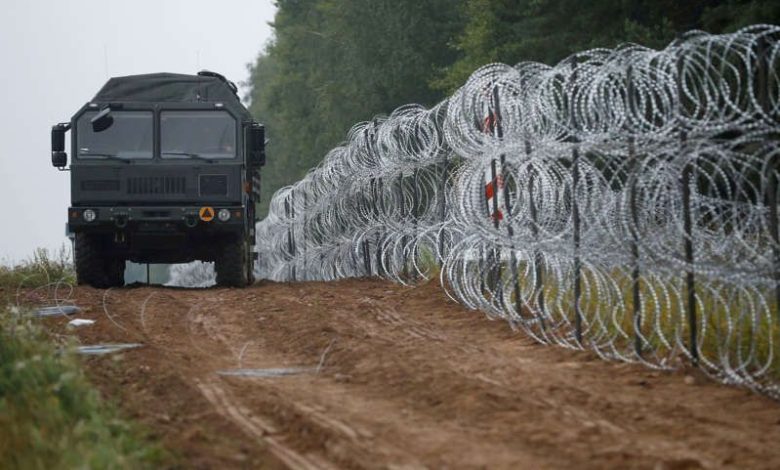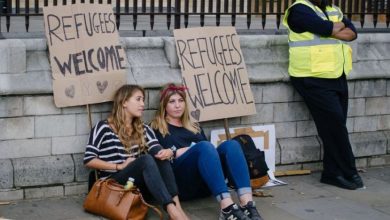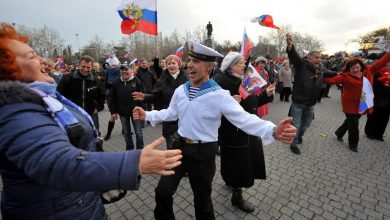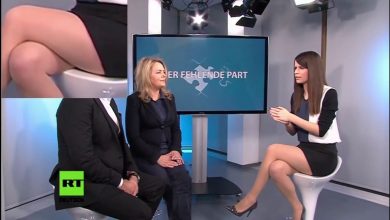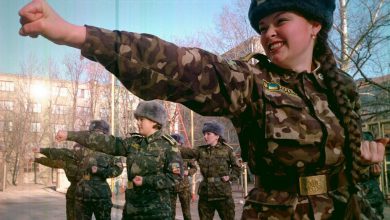Hybrid war on the border of Belarus and Poland
Polish authorities vowed to block the entry of hundreds of migrants amassed on its border with Belarus, where the government has been accused of weaponizing refugees against the European Union.
Polish border during the migrant crisis in Lewosze, Poland
The Polish Ministry of Defense posted an aerial video of a large group of people gathered next to the border fence near the Polish village of Kuźnica, with Polish guards lined up to face them on the other side.
“They will not come in,” Maciej Wąsik, Poland’s deputy interior minister wrote on Twitter, adding said the Polish border guard, police and army were ready to push them back. “Poland’s state services are prepared for all circumstances,” he said.
As the dramatic scene unfolded, Lithuania, which also has a frontier nearby, moved troops to its border, according to Reuters, citing the country’s Interior Minister Agne Bilotiate.
Earlier videos had showed the large columns of migrants carrying suitcases and belongings, walking along a highway empty of traffic, escorted by armed Belarusian servicemen.
The European Union has blamed Belarusian authorities for creating a migrant crisis as a tool to amp up pressure on Europe. Angered by E.U. sanctions, President Alexander Lukashenk warned in late June that Belarus would no longer prevent asylum seekers, drugs and even nuclear materials from entering the European Union.
The Belarusian State Border Committee blamed Poland for Monday’s incident, claiming that “the indifference and inhuman attitude of the Polish authorities prompted the refugees to take such a step of despair.” Belarusian border guards told state-owned Russian news agency RIA Novosti that around 3,000 people were moving toward the border, including women and children.
Humanitarian groups say that unsuspecting, vulnerable refugees and migrants caught in the middle are at extreme risk, as they are ping-ponged between the borders with temperatures dropping. The initially small number of crossings has grown in recent weeks.
“More and more people are coming,” said Kalina Czwarnog, a coordinator with Fundacja Ocalenie, which tries to provide humanitarian assistance to those who have crossed. She said their conditions varied. “Sometimes people are in a state of hypothermia and they really can’t walk again and sometimes people are in good shape,” she said, adding she was concerned there could be violence at the border as neo-Fascist groups have also mobilized to “help” the border guards.
“This border is sacred,” Polish Prime Minister Mateusz Morawiecki, said on Monday. “The border of the Polish state is not just a line on the map. Generations of Poles shed their blood for this border.”
He said that all parties should be on the side of the border guards in the face of the “threat.”
Independent Belarusian media outlet Nexta reported that the migrants were blocked from reaching the Belarus border checkpoint and were funneled by Belarusian security forces into a forest adjacent to the border.
Other independent Belarusian media posted video of several hundred migrants in a forest next to the barbed wire border fence. Some were standing next to the fence, unable to proceed. Others, including women and children were seated on the grass.
Franak Viačorka, an adviser to Belarusian opposition leader, Svetlana Tikhanovskaya, tweeted that the migrant crisis was “true state-backed smuggling,” organized by Lukashenko.
Earlier in the summer, refugees had largely been directed toward Lithuania, where officials accused Lukashenko of weaponizing refugees in a “hybrid attack,” and erected barbed wire fencing to prevent migrants from entering from Belarus.
At the European Union summit last month, outgoing German Chancellor Angela Merkel threatened further economic sanctions against Belarus to convey condemnation of what she described as a “form of human trafficking — it must be said — by the state.”
In September Polish President Andrzej Duda declared a state of emergency covering 183 towns and villages in two provinces neighboring Belarus, the first time such powers have been used since the fall of Communism.
Russian authorities praised Belarusian for handling the crisis “in a legal way.” Kremlin spokesman Dmitry Peskov there was no doubt that Belarusian authorities were “taking all necessary measures to ensure the security of both Russia and Belarus in connection with the situation with migrants on the Polish-Belarusian border.”
Hundreds of migrants trapped in Belarus-Poland border standoff
Hundreds of desperate migrants were trapped in freezing weather on the border between Poland and Belarus on Tuesday, with Warsaw accusing the regime in Minsk of using them to threaten European security.
Western critics have for months said Belarus’s strongman leader Alexander Lukashenko is luring migrants from the Middle East to his country to send them across the border, in retaliation for European sanctions.
Belarus denies the claim and accuses Poland of violating human rights by refusing to allow the migrants in.
The tense situation has raised fears of a confrontation on the border, where armed troops from both countries are deployed.
The crisis came to a head on Monday when hundreds of migrants marched to the border in a bid to cross but were blocked by rows of Polish border guards behind barbed wire.
Poland and Belarus said Tuesday that between 3,000 to 4,000 migrants were now in an improvised camp on the border, near the Polish village of Kuznica.
Journalists have been blocked from the area, but videos released by Belarusian and Polish authorities showed the migrants massed along the razor-wire, huddling by fires and in tents as temperatures hovered around freezing.
Hybrid attack
Poland said Belarus was using the migrants as a weapon, insisting it would not open its border.
“Sealing the Polish border is our national interest. But today the stability and security of the entire EU is at stake,” Prime Minister Mateusz Morawiecki said on Twitter.
“This hybrid attack of Lukashenko’s regime is aimed at all of us. We will not be intimidated and will defend peace in Europe with our partners from NATO and EU.”
President Andrzej Duda accused the Belarusian regime of “attacking Poland’s border, the EU border, in a hitherto unprecedented way.”
But Belarus said Warsaw’s treatment of the migrants would be a “litmus test” of its commitment to international norms and cautioned against any “provocations”.
“We would like to warn the Polish side in advance against any provocations directed against the Republic of Belarus to justify illegal use of force against disadvantaged, unarmed people, among whom there are many children and women,” the foreign ministry in Minsk said in a statement.
EU looks at new sanctions
The Belarusian defence ministry said Poland had deployed 10,000 military personnel to the border without giving prior warning to Belarusian authorities, in what it said was a violation of joint security agreements.
Poland’s defence ministry tweeted video footage showing what it said appeared to be a “large group of Belarusian officers” approaching the vicinity of the migrant camp.
The United States and NATO, of which Poland is a member, on Monday accused Belarus of orchestrating the flow of migrants and demanded it stop.
The European Union called for new sanctions on Belarus, on top of those already applied over Lukashenko’s fierce crackdown on the opposition after a disputed election last year.
France’s foreign ministry said Tuesday it would consider “reinforcement” of sanctions, accusing Minsk of “seeking to destabilise the EU”.
EU diplomats in Brussels told AFP the bloc was already working on moves to expand existing sanctions to include those involved in trafficking migrants, including potentially airlines and travel agencies.
In Moscow, Russian Foreign Sergei Lavrov blamed Western military “adventures” in the Middle East for prompting migrants to flee the region in the first place.
“The main responsibility for resolving the crisis with migrants, lies of course with those who created the conditions,” Lavrov told reporters.
Moscow is Belarus’s main international backer and the Kremlin said Tuesday that President Vladimir Putin had “exchanged opinions on the situation with refugees” in a phone call with Lukashenko.
UN ‘very alarmed’
The UN refugee agency said it was “very alarmed” by the situation on the border and had offered its help.
Some migrants who made it into Poland told AFP last month that they had been trapped in the woods for a week, with Belarus refusing to allow them to return to Minsk and fly home, while Poland would not let them cross to make asylum claims.
The Belarusian border guard service said Tuesday that the migrants in the camp were mostly Kurds, that their physical and mental condition was “extremely poor” and they lacked water, food and the means to wash themselves.
“The situation is aggravated by the large number of pregnant women and infants among the refugees, who must spend the night on the ground in negative temperatures,” it said.
It accused Polish forces of using tear gas and “psychological pressure” on the migrants including “loudspeakers, spotlights and strobe lights the entire night.”
“Shots were also heard,” it said.
Poland-Belarus border crisis: What’s going on and who’s to blame?
Thousands of migrants have been gathering at the border between Belarus and Poland this week in a stand-off that is threatening a humanitarian disaster on the edge of the EU and has sent tensions rising among political foes across the region.
The migrants have been met with barb wire fencing and lines of Polish soldiers who have been drafted in their thousands to guard the frontier. Clashes have taken place with Polish police carrying riot shields as migrants have used logs, spades and other implements to try to break through.
It has sparked a geopolitical row involving the European Union and the US, who accuse Russia-backed Belarus of waging a “hybrid war” against the West by luring migrants from war-torn Syria and Iraq and sending them to the border of the EU in a bid to destabilise the region.
What’s happening at the border?
Around 2,000 migrants have been camping since Monday on the Belarus side of the border, waiting in freezing conditions with little food and shelter.
Video and photographs shows young children and babies among the people stuck at the border.
“There are lots of families here with babies between two or four months old. They have not eaten anything for the past three days,” said one person who filmed the disturbing scenes.
Migrants have complained of being repeatedly pushed back by Polish and Belarusian border guards, putting them at risk of exposure, lack of food and water.
“Yesterday we helped to secure and evacuate one group of immigrants,” said Michal Swiatkowski, 30, a member of the Polish Red Cross rescue group, on Wednesday
“There were 16 people, most of them were children. They did not require medical attention, although we donated warm clothes, blankets and some food,” he told Reuters.
Poland’s Border Guard recorded nearly 1,000 illegal attempts to cross the border on Monday and Tuesday, and have detained or sent back dozens of people.
Several deaths have been reported on both sides of the border.
How did this come about?
The EU accuses Belarus of inviting thousands of desperate migrants to fly to the country in order to spark a confrontation and destabilise the bloc.
Furious at sanctions imposed by the West on his regime, Belarusian President Alexander Lukashenko announced in July he would allow no longer stop masses of refugees from countries like Afghanistan, Syria and Iraq coming into “warm and comfortable” Europe. “We will not stop anyone,” he said.
Since then, travel agents have been targeting Iraqis and Syrians with offers of package trips to Belarus, implying they can travel on to seek work in Europe.
On Monday, videos emerged showing Belarusian guards in camouflage marching hundreds of migrants along a road leading up to the Polish border region of Podlaskie.
The EU say Mr Lukashenko is seeking revenge for earlier sanctions imposed by the bloc, the US and Britain over Belarus’s violent crackdown on mass street protests that were sparked by Mr Lukashenko’s disputed election victory in 2020.
Some migrants have complained of being repeatedly pushed back and forth by Polish and Belarusian border guards, putting them at risk of exposure, lack of food and water.
Poland denies accusations by humanitarian groups that it is violating the international right to asylum by hustling migrants back into Belarus instead of accepting their applications for protection.
How has Poland responded?
Warsaw declared a state of emergency that prevents aid from reaching those trapped in the border area. It has also made it harder for journalists to independently verify claims from both nations about what exactly is going on.
Poland said on Monday it had stationed more than 12,000 troops at the border. It has since added a further 3,000 guards to patrol the 250-mile long frontier.
The Polish authorities accuse Belarus of trying to spark a major confrontation.
“Belarus wants to cause a major incident, preferably with shots fired and casualties,” Deputy Foreign Minister Piotr Wawrzyk told Polish public radio on Monday.
What about the international community?
The crisis has exposed the political fault lines through Europe with the EU strongly backing Poland, and Russia quick to criticise the bloc’s response.
EU leaders accuse Mr Lukashenko’s regime of opening up a new migration route to Europe to create instability in retaliation for the sanctions.
The bloc’s 27 ambassadors agreed on Wednesday that the growing numbers of migrants flying to Belarus to reach the EU border amounted to “hybrid warfare” by Mr Lukashenko, which would provide a legal basis for new sanctions.
“Mr Lukashenko unscrupulously exploits people seeking refuge as hostages for his cynical power play,” Germany’s acting Foreign Minister Heiko Maas said on Twitter.
He described images from the Belarusian border, where people are stuck in freezing conditions with little food and shelter, as “horrific” but said the EU could not be blackmailed.
Later on Wednesday, European Commission president Ursula von der Leyen announced that EU sanctions against Belarus would be widened next week.
The US also vowed to impose “follow-up sanctions” following a meeting between Mrs von der Leyen and President Joe Biden.
“We are deeply concerned by the Lukashenko regime’s inhumane actions and strongly condemn their callous exploitation and coercion of vulnerable people,” a White House National Security Council spokesman said.
In a bid to calm the growing tensions, German Chancellor Angela Merkel asked Russian President Vladimir Putin on Wednesday to intervene with Belarus over the migrant situation.
The chancellor’s office said Mrs Merkel spoke with Mr Putin by phone and underlined that the exploitation “of migrants against the European Union by the Belarusian regime is inhumane and completely unacceptable.”
Mrs Merkel asked the Russian president “to exert his influence on the regime in Minsk”.
Russia blames the EU for the crisis on the border, accusing it of failing to uphold its own humanitarian values and of trying to “strangle” Belarus with plans to close part of the frontier.
In a show of strength and support for Minsk, Russia took the rare step of dispatching two nuclear-capable strategic bombers to patrol Belarusian airspace on Wednesday.
United Nations human rights chief Michelle Bachelet called on states to de-escalate and resolve the “intolerable” crisis.
“These hundreds of men, women and children must not be forced to spend another night in freezing weather without adequate shelter, food, water and medical care,” she said.
What has Belarus said?
Mr Lukashenko has denied using the migrants as weapons and has blamed Europe for the crisis at the border.
It summoned Poland’s defence attache on Tuesday to protest what it said were unfounded allegations about the involvement of Belarusian military personnel in the crisis.
Mr Lukashenko and Mr Putin discussed the situation by phone and expressed concern over the build-up of Polish troops at the border, the Belarusian state news agency Belta reported.
“To conduct a war with these unfortunate people on the border of Poland with Belarus and move forward columns of tanks – it’s clear this is either a training exercise or it’s blackmail,” Mr Lukashenko said in televised comments.
“We will calmly stand up to this.”
This post is also available in:
 English
English  Русский (Russian)
Русский (Russian)

